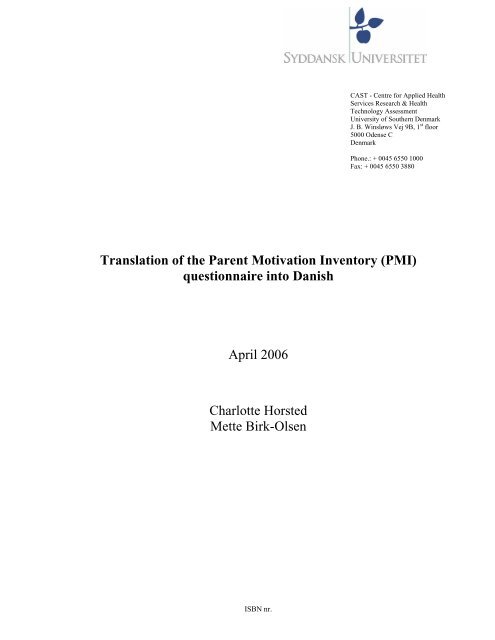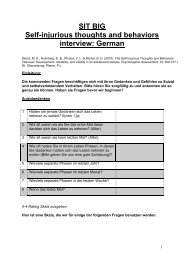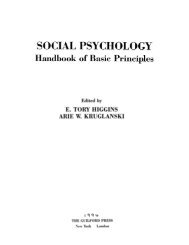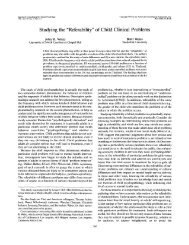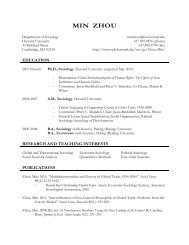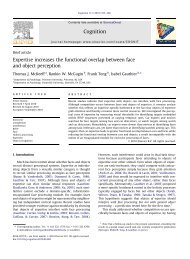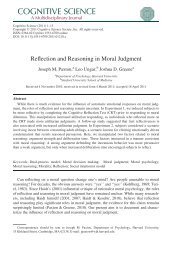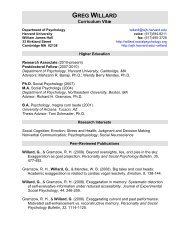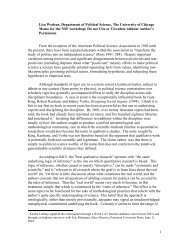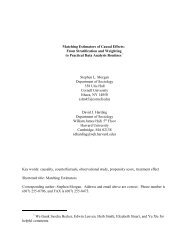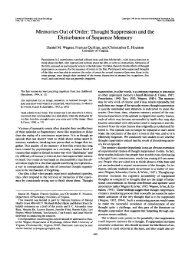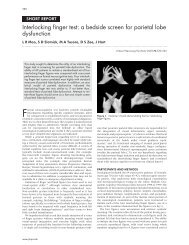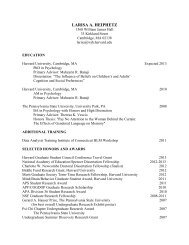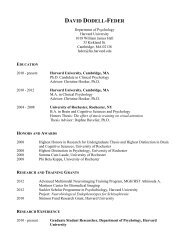Translation of the Parent Motivation Inventory (PMI) - Wjh.harvard ...
Translation of the Parent Motivation Inventory (PMI) - Wjh.harvard ...
Translation of the Parent Motivation Inventory (PMI) - Wjh.harvard ...
Create successful ePaper yourself
Turn your PDF publications into a flip-book with our unique Google optimized e-Paper software.
<strong>Translation</strong> <strong>of</strong> <strong>the</strong> <strong>Parent</strong> <strong>Motivation</strong> <strong>Inventory</strong> (<strong>PMI</strong>)<br />
questionnaire into Danish<br />
April 2006<br />
Charlotte Horsted<br />
Mette Birk-Olsen<br />
ISBN nr.<br />
CAST - Centre for Applied Health<br />
Services Research & Health<br />
Technology Assessment<br />
University <strong>of</strong> Sou<strong>the</strong>rn Denmark<br />
J. B. Winsløws Vej 9B, 1 st floor<br />
5000 Odense C<br />
Denmark<br />
Phone.: + 0045 6550 1000<br />
Fax: + 0045 6550 3880
Title:<br />
Author:<br />
Institute:<br />
Publisher:<br />
Publication date<br />
Place <strong>of</strong><br />
printing<br />
ISBN no.<br />
Bar code<br />
Colophon<br />
<strong>Translation</strong> <strong>of</strong> <strong>the</strong> <strong>Parent</strong> <strong>Motivation</strong> <strong>Inventory</strong> (<strong>PMI</strong>) questionnaire into<br />
Danish<br />
Charlotte Horsted, Mette Birk-Olsen<br />
CAST - Centre for Applied Health Services Research & Health<br />
Technology Assessment
Contents<br />
1 Introduction ......................................................................................................................................4<br />
2 <strong>Translation</strong> process...........................................................................................................................5<br />
2.1 Forward translation ....................................................................................................................5<br />
2.2 Backward translation .................................................................................................................6<br />
Appendix 1: Forward translation <strong>of</strong> <strong>the</strong> <strong>PMI</strong> – results.........................................................................8<br />
Appendix 2: Backward translation <strong>of</strong> <strong>the</strong> <strong>PMI</strong> – results ....................................................................11<br />
Appendix 3: The final questionnaire – Danish layout........................................................................15<br />
Acknowledgements<br />
The authors thank Charlotte Bruun Pedersen, Claire Gudex and Simon Lee for providing<br />
translations <strong>of</strong> <strong>the</strong> <strong>PMI</strong>.<br />
Permission to use <strong>the</strong> <strong>PMI</strong> was obtained from one <strong>of</strong> <strong>the</strong> instrument’s developers (Mat<strong>the</strong>w K.<br />
Nock).
1 Introduction<br />
This report describes <strong>the</strong> process undertaken in <strong>the</strong> translation <strong>of</strong> <strong>the</strong> <strong>Parent</strong> <strong>Motivation</strong><br />
<strong>Inventory</strong> (<strong>PMI</strong>) questionnaire from US-English into Danish. It is written primarily as<br />
documentation for review by <strong>the</strong> developers <strong>of</strong> <strong>the</strong> <strong>PMI</strong>, but it is hoped that it also provides<br />
useful background information for future Danish users <strong>of</strong> <strong>the</strong> <strong>PMI</strong>.<br />
In Denmark <strong>the</strong>re is an increasing demand for documentation <strong>of</strong> how interventions in <strong>the</strong> social<br />
areas <strong>of</strong> <strong>the</strong> community works. To day <strong>the</strong> municipalities are doing a lot <strong>of</strong> important and good<br />
work without knowing which effort or arrangement works, how it works and for whom it works.<br />
The government wants to find out how to measure <strong>the</strong> effect <strong>of</strong> a given program and use this<br />
knowledge to create focus on evidence based interventions that works.<br />
A study is being planned to asses <strong>the</strong> effects and <strong>the</strong> implementation <strong>of</strong> <strong>Parent</strong> Management<br />
Training (PMT) in Denmark. The study is undertaken by <strong>the</strong> ‘Centre for Applied Health Services<br />
Research and Health Technology Assessment’ (CAST) at <strong>the</strong> University <strong>of</strong> Sou<strong>the</strong>rn Denmark, in<br />
collaboration with <strong>the</strong> ‘School <strong>of</strong> Social Work – Odense’ and ‘Odense College <strong>of</strong> Social Education.<br />
The project receives financial support from <strong>the</strong> National Board <strong>of</strong> Social Services under <strong>the</strong><br />
Ministry <strong>of</strong> Social Affairs.<br />
The <strong>PMI</strong> will be used in a study involving approximately 24 families who will undergo PMTtreatment<br />
and 24 families who will get treatment as usual (TAU). The study is designed as a<br />
randomised controlled trial (RCT) and will take place in three Danish municipalities.<br />
Although this questionnaire was developed to assess American parents’ motivation to participate in<br />
treatment <strong>the</strong> items were judged to be appropriate for assessing Danish parents’ motivation as well.<br />
Fur<strong>the</strong>rmore, this will make it possible to do comparative analyses between Danish and American<br />
parents’ motivation to participate in treatment. Ano<strong>the</strong>r purpose <strong>of</strong> <strong>the</strong> study is to examine <strong>the</strong><br />
parents’ degree <strong>of</strong> motivation during <strong>the</strong> treatment and see if <strong>the</strong> treatment effect is correlated with<br />
<strong>the</strong> parents’ degree <strong>of</strong> motivation.
2 <strong>Translation</strong> process<br />
As <strong>the</strong> <strong>PMI</strong> had not previously been translated into Danish, CAST 1 undertook to translate <strong>the</strong> <strong>PMI</strong><br />
from US-English into Danish after agreement from <strong>the</strong> questionnaires developers 2 . In line with<br />
established practice for translation <strong>of</strong> measuring instruments, <strong>the</strong> process involved several stages:<br />
A. Forward translation<br />
• Two forward translations <strong>of</strong> <strong>the</strong> <strong>PMI</strong> from English into Danish, undertaken independently<br />
by two native Danish speakers<br />
• Production <strong>of</strong> a first ‘reconciliation’ Danish version via discussion between <strong>the</strong> forward<br />
translators<br />
B. Backward translation<br />
• Two back translations <strong>of</strong> <strong>the</strong> Danish reconciliation version into English, undertaken<br />
independently by two native English speakers who were not familiar with <strong>the</strong> wording <strong>of</strong> <strong>the</strong><br />
original <strong>PMI</strong> items.<br />
C. Production <strong>of</strong> a Danish version to be used in <strong>the</strong> PMT- research study.<br />
• Comparison between <strong>the</strong> two back translations and <strong>the</strong> original English <strong>PMI</strong> to identify any<br />
discrepancies, misunderstandings, ambiguity etc.<br />
• Production <strong>of</strong> a second reconciliation Danish version<br />
2.1 Forward translation<br />
The 25 items <strong>of</strong> <strong>the</strong> <strong>PMI</strong> were translated into Danish by two native Danish speakers, working<br />
independently. Both translators work in health and social service research and have a good working<br />
knowledge <strong>of</strong> English and previous experience <strong>of</strong> translation from English into Danish.<br />
When each forward translation was complete, <strong>the</strong> two translators met to discuss discrepancies<br />
between <strong>the</strong>ir two versions (‘A’ and ‘B’ in Appendix 1). They <strong>the</strong>n produced a first ‘reconciliation’<br />
Danish version that <strong>the</strong>y considered to be <strong>the</strong> best translation <strong>of</strong> <strong>the</strong> original English text.<br />
There were no major problems in translating <strong>the</strong> <strong>PMI</strong> items into Danish and <strong>the</strong> two translations<br />
were quite similar to each o<strong>the</strong>r. There were, however, a few items that included words or concepts<br />
that could be translated in different ways depending on <strong>the</strong> intended meaning <strong>of</strong> <strong>the</strong> original English<br />
text. These words/concepts were:<br />
1 Centre for Applied Health Services Research & Health Technology Assessment (Center for Anvendt Sundhedstjenesteforskning og<br />
Teknologivurdering - CAST), University <strong>of</strong> Sou<strong>the</strong>rn Denmark<br />
2 Mat<strong>the</strong>w K. Nock, Ph.D, Assistant Pr<strong>of</strong>essor, Department <strong>of</strong> Psychology, Harvard University, Cambridge, MA.<br />
Valerie Photos, B.A. Doctoral student, Dapartment <strong>of</strong> Psychology, Harvard University, Cambridge, MA.
• Well-being. Well-being can be translated as ‘velvære’ (to be comfortable – more individual<br />
concept), or ‘trivsel’ (be doing fine (thrive) – can be more than one person) or<br />
‘velbefindende’ (to be comfortable – relates more to ones health). We chose ’trivsel’ to be<br />
<strong>the</strong> most appropriate concept in this context.<br />
• Behaviour: Behaviour can be translated as ei<strong>the</strong>r ‘opførsel’ (<strong>the</strong> way one behaves or<br />
manner) or ‘adfærd’ (manner or conduct). We chose ‘adfærd’ as being <strong>the</strong> best translation<br />
for behaviour here.<br />
• <strong>Parent</strong>ing techniques: A direct translation would be ‘forældreomsorgsteknikker’<br />
(‘forældreomsorg’ - <strong>the</strong> way parents take care <strong>of</strong>/look after <strong>the</strong>ir child and ‘teknikker’ -<br />
technique) which both translators believed to be bad Danish (not a used concept). Instead<br />
both chose <strong>the</strong> wording ‘opdragelsesteknikker’ (techniques <strong>of</strong> upbringing) to describe <strong>the</strong><br />
item content.<br />
• Question 12 and 15: … experience many negative outcomes in life. A direct translation<br />
would be ‘opleve mange negative udfald/resultater/situationer i sit liv’. This sentence does,<br />
however, not give much meaning and could easily be misunderstood – or not understood at<br />
all. The translators <strong>the</strong>refore chose to translate it with ‘…have mange negative oplevelser i<br />
sit liv’ ( …having many negative experiences in life).<br />
• The original US-English version only addresses parents <strong>of</strong> boys. In <strong>the</strong> Danish study (or in<br />
Denmark in general) it is expected that <strong>the</strong>re also will be girls who undergo treatment with<br />
<strong>the</strong>ir parents. In those circumstances where <strong>the</strong> original US-English version said ‘he/his’ <strong>the</strong><br />
Danish version says ‘hans/hendes’ (his/her) or ‘han/hun’ (he/she).<br />
2.2 Backward translation<br />
The first reconciliation Danish version was translated back into English by two native English<br />
speakers, working independently. Both translators have a good working knowledge <strong>of</strong> Danish and<br />
one has previous experience <strong>of</strong> translating ‘quality <strong>of</strong> life’ instruments 3 .<br />
When each back translation was complete one <strong>of</strong> <strong>the</strong> back translators (C in appendix 2) met with<br />
one <strong>of</strong> <strong>the</strong> forward translators (A in appendix 1) to discuss discrepancies between <strong>the</strong> two backward<br />
translations (‘C’ and ‘D’ in Appendix 2) and <strong>the</strong> original US-English version. Changes were made<br />
to <strong>the</strong> Danish text as appropriate and a second reconciliation Danish version was produced. The<br />
items for <strong>the</strong> second reconciliation Danish version are printed in bold in Appendix 2.<br />
The two backward translations were quite similar to each o<strong>the</strong>r and to <strong>the</strong> original US-English<br />
version (Appendix 2). Many <strong>of</strong> <strong>the</strong> differences were minor and simply arose from different ways <strong>of</strong><br />
3 EQ5D – Claire Gudex is a member <strong>of</strong> <strong>the</strong> EuroQol group.
saying <strong>the</strong> same things – maybe some <strong>of</strong> <strong>the</strong> minor differences arose simply because <strong>of</strong> linguistic<br />
differences: translator C in Appendix 2 originates from New Zealand and translator D from UK.<br />
Some <strong>of</strong> <strong>the</strong> items required fur<strong>the</strong>r discussion but only one was altered in <strong>the</strong> light <strong>of</strong> <strong>the</strong> back<br />
translations:<br />
Question 2: I am willing to work on changing my own behaviour as it relates to managing my child.<br />
Both forward translators had understood <strong>the</strong> question as being one having a course and an effect –<br />
<strong>the</strong> backward translator thought we had made an over interpretation. Instead <strong>the</strong> Danish Worthing<br />
was translated “Jeg er villig til at arbejde med at ændre min egen adfærd i forbindelse med hvordan<br />
jeg håndterer mit barn” (lit: I am willing to work on changing my own behaviour in relation to how<br />
I handle my child).
Appendix 1: Forward translation <strong>of</strong> <strong>the</strong> <strong>PMI</strong> – results<br />
The following are listed for each item in turn: <strong>the</strong> original English wording (OE), <strong>the</strong> two forward<br />
translations (a & b) and <strong>the</strong> 1 st reconciliation Danish text (bold text).<br />
The response categories where translated as:<br />
Strongly Disagree – Meget uenig<br />
Disagree - Uenig<br />
Neutral – Neutral<br />
Agree – Enig<br />
Strongly Agree – Meget enig<br />
OE<br />
A<br />
B<br />
1 OE<br />
A<br />
B<br />
A1<br />
2 OE<br />
A<br />
B<br />
A2<br />
3 OE<br />
A<br />
B<br />
A3<br />
4 OE<br />
A<br />
B<br />
A4<br />
All parents who come to <strong>the</strong> clinic for treatment with <strong>the</strong>ir children are different. How much do you agree<br />
with each <strong>of</strong> <strong>the</strong> following statements related to your participation in your child’s treatment? Your responses<br />
will not affect <strong>the</strong> treatment you receive in any way. Thank you.<br />
Alle forældre, der modtager behandling sammen med deres børn, er forskellige. Hvor enig er du i de følgende<br />
udsagn, som relaterer sig til din deltagelse i dit barns behandling? Dine besvarelser vil på ingen måde påvirke<br />
den behandling du modtager.<br />
(på forhånd) mange tak.<br />
Alle forældre som kommer i klinikken med deres børn og modtager behandling er forskellige fra<br />
hinanden/unikke…I hvilken grad er du enig med hvert af de følgende udsagn, som vedrører din deltagelse i<br />
dit barns behandling. Dine svar vil ikke påvirke den behandling I modtager på nogen måde. Tak for din<br />
deltagelse.<br />
Alle forældre, der modtager behandling sammen med deres børn, er forskellige. Hvor enig er du i de<br />
følgende udsagn, som vedrører din deltagelse i dit barns behandling? Dine besvarelser vil på ingen<br />
måde påvirke den behandling I modtager. Tak for din besvarelse.<br />
My child’s behavior has to improve soon<br />
Det er nødvendigt at mit barns adfærd snart forbedres.<br />
Mit barns opførsel/adfærd (må og) skal snart forbedre sig/blive bedre.<br />
Det er nødvendigt, at mit barns adfærd snart bliver bedre.<br />
I am willing to work on changing my own behavior as it relates to managing my child<br />
Jeg er villig til at arbejde på at ændre min egen adfærd da det relaterer sig hvordan jeg (opdrager?) styrer mit<br />
barn.<br />
Jeg er villig til at arbejde med at ændre min egen opførsel/adfærd, da det hører sammen med at styre/håndtere<br />
mit barn.<br />
Jeg er villig til at arbejde med at ændre min egen adfærd, da det hører sammen med hvordan jeg<br />
håndterer mit barn.<br />
It is very important for <strong>the</strong> well-being <strong>of</strong> my family that my child changes his behavior<br />
Det er meget væsentligt for min families velvære (trivsel) at mit barn ændrer sin adfærd.<br />
Det er meget vigtigt for min families velbefindende, at mit barn ændrer sin opførsel/adfærd.<br />
Det er meget væsentligt for min families trivsel, at mit barn ændrer sin adfærd.<br />
I am prepared to come to <strong>the</strong> clinic every week for several months in order to change my child’s behavior<br />
Jeg er indstillet på at komme til konsultationer hver uge i flere måneder for at ændre mit barns adfærd.<br />
Jeg er indstillet på at komme på klinikken hver uge i adskillige måneder for at ændre mit barns<br />
opførsel/adfærd.<br />
Jeg er indstillet på at komme til konsultationer hver uge i flere måneder for at ændre mit barns<br />
adfærd.
5 OE<br />
A<br />
B<br />
A5<br />
6 OE<br />
A<br />
B<br />
A6<br />
7 OE<br />
A<br />
B<br />
A7<br />
8 OE<br />
A<br />
B<br />
A8<br />
9 OE<br />
A<br />
B<br />
A9<br />
10 OE<br />
A<br />
B<br />
A10<br />
11 OE<br />
A<br />
B<br />
A11<br />
12 OE<br />
A<br />
B<br />
A12<br />
13 OE<br />
A<br />
B<br />
A13<br />
14 OE<br />
A<br />
B<br />
A14<br />
15 OE<br />
A<br />
B<br />
A15<br />
16 OE<br />
A<br />
B<br />
A16<br />
Although <strong>the</strong> main problem is with my child’s behavior, I believe I should come to treatment every week<br />
Selvom det primære problem omhandler mit barns adfærd, da mener jeg at jeg skal komme til behandling<br />
hver uge<br />
Selvom hovedproblemet er mit barns opførsel/adfærd, så mener jeg, at jeg skal komme til behandling hver<br />
uge (komme på kurset)…<br />
Selvom hovedproblemet er mit barns adfærd, så mener jeg, at jeg skal komme til behandling hver<br />
uge.<br />
It is very important for <strong>the</strong> well-being <strong>of</strong> my child that he changes his behavior<br />
Det er meget vigtigt for mit barns velvære, at han/hun ændre sin adfærd.<br />
Det er meget vigtigt for mit barns velbefindende, at han ændrer sin opførsel/adfærd.<br />
Det er meget vigtigt for mit barns trivsel, at han/hun ændrer sin adfærd.<br />
I am willing to change my current parenting techniques and try new ones<br />
Jeg er klar til at ændre den måde jeg aktuelt tager mig af mit barn og forsøge med nye opdragelsesteknikker<br />
Jeg er villig til at ændre mine nuværende opdragelsesteknikker og prøve nogle nye.<br />
Jeg er villig til at ændre mine nuværende opdragelsesteknikker og prøve nogle nye.<br />
I think <strong>the</strong> benefits <strong>of</strong> this treatment will be greater than <strong>the</strong> costs<br />
Jeg tror at fordelene ved denne behandling er større end omkostningerne<br />
Jeg tror at fordelene ved denne behandling vil være større end omkostningerne.<br />
Jeg tror, at fordelene ved denne behandling vil være større end omkostningerne.<br />
I would like my child’s behavior to change<br />
Jeg ser gerne at mit barns adfærd ændre sig<br />
Jeg vil gerne have at mit barns opførsel/adfærd ændrer sig.<br />
Jeg vil gerne have, at mit barns adfærd ændrer sig.<br />
I am willing to try parenting techniques even if I think <strong>the</strong>y might not work<br />
Jeg er villig til at prøve opdragelsesteknikker, selvom jeg ikke tror, at de vil fungere.<br />
Jeg er villig til at prøve opdragelsesteknikker, selvom jeg ikke tror de vil virke.<br />
Jeg er villig til at prøve opdragelsesteknikker, selvom jeg ikke tror de virker.<br />
I want to be involved in my child’s treatment at this point in time<br />
Jeg ønsker på nuværende tidspunkt at være involveret i mit barns behandling.<br />
Jeg ønsker at være involveret i mit barns behandling på nuværende tidspunkt.<br />
Jeg ønsker på nuværende tidspunkt at være involveret i mit barns behandling.<br />
My child will experience many negative outcomes in life if his behavior does not change<br />
Mit barn vil opleve mange negative udfald i sit liv hvis hans/hendes adfærd ikke ændres<br />
Mit barn vil (have mange negative oplevelser) opleve mange negative resultater/situationer/udfald i sit liv,<br />
hvis ikke hans opførsel/adfærd ændrer sig.<br />
Mit barn vil have mange negative oplevelser i sit liv, hvis ikke hans/hendes adfærd ændrer sig.<br />
I am motivated to practice <strong>the</strong> techniques I will learn in session at home with my child<br />
Jeg er motiveret til at udføre de teknikker, som jeg kommer til at lære i sessionerne, sammen med mit barn<br />
derhjemme.<br />
Jeg er motiveret til at anvende de teknikker jeg lærer på kurset med mit barn derhjemme.<br />
Jeg er motiveret til at udføre de teknikker, som jeg kommer til at lære i konsultationerne, sammen<br />
med mit barn derhjemme<br />
I believe that my child’s behavior cannot change without my involvement in treatment<br />
Jeg er overbevist om at mit barns adfærd ikke kan ændres uden min inddragelse i behandlingen<br />
Jeg tror ikke at mit barns opførsel/opførsel kan ændre sig uden min involvering i behandlingen.<br />
Jeg er overbevist om, at mit barns adfærd ikke kan ændre sig uden min inddragelse i behandlingen<br />
My family will experience many negative outcomes in life if my child’s behavior does not change<br />
Min familie vil opleve mange negative udfald her i livet hvis mit barns adfærd ikke ændre sig<br />
Min familie vil (have mange negative oplevelser) opleve mange negative resultater/situationer/udfald, hvis<br />
mit barns opførsel/adfærd ikke ændrer sig.<br />
Min familie vil have mange negative oplevelser, hvis mit barns adfærd ikke ændrer sig.<br />
I am eager to participate in treatment<br />
Jeg er spændt på at deltage i behandlingen.<br />
Jeg (ser frem til at /)er ivrig efter at deltage i behandlingen.<br />
Jeg er spændt på at deltage i behandlingen.
17 OE<br />
A<br />
B<br />
A17<br />
18 OE<br />
A<br />
B<br />
A18<br />
19 OE<br />
A<br />
B<br />
A19<br />
20 OE<br />
A<br />
B<br />
A20<br />
21 OE<br />
A<br />
B<br />
A21<br />
22 OE<br />
A<br />
B<br />
A22<br />
23 OE<br />
A<br />
B<br />
A23<br />
24 OE<br />
A<br />
B<br />
A24<br />
25 OE<br />
A<br />
B<br />
A25<br />
I believe that changing my own behavior can cause my child’s behavior to change<br />
Jeg tror at jeg ved at ændre min egen adfærd kan fremkalde ændring i mit barns adfærd.<br />
Jeg tror på at hvis jeg ændrer min egen opførsel/adfærd, kan dette medføre at mit barns opførsel/adfærd<br />
ændrer sig.<br />
Jeg tror, at jeg ved at ændre min egen adfærd kan fremkalde ændring i mit barns adfærd.<br />
I want my child’s behavior to improve<br />
Jeg ønsker at mit barns adfærd forbedres.<br />
Jeg ønsker at mit barns opførsel/adfærd skal forbedre sig/blive bedre.<br />
Jeg ønsker, at mit barns adfærd skal blive bedre.<br />
I am motivated to change <strong>the</strong> way I reward and punish my child if it will lead to improvement<br />
Jeg er motiveret til at ændre den måde jeg belønner og afstraffer mit barn på, hvis dette vil medføre<br />
forbedring<br />
Jeg er villig til at ændre den måde jeg belønner og straffer mit barn på, hvis dette vil medføre forbedring.<br />
Jeg er villig til at ændre den måde jeg belønner og straffer mit barn på, hvis dette vil medføre<br />
forbedring.<br />
I believe that I can learn to change my child’s behavior<br />
Jeg tror, at jeg kan lære at ændre mit barns adfærd<br />
Jeg tror, at jeg kan lære at ændre mit barns opførsel/adfærd.<br />
Jeg tror, at jeg kan lære at ændre mit barns adfærd<br />
I am motivated to participate in my child’s treatment each week<br />
Jeg er motiveret til at tage del i mit barns ugentlige behandling.<br />
Jeg er motiveret til at deltage i mit barns behandling hver uge.<br />
Jeg er motiveret til at deltage i mit barns behandling hver uge.<br />
Participation in this treatment is a top priority in my schedule and that <strong>of</strong> my child<br />
Deltagelse i denne behandling har topprioritet i min og mit barns planlægning.<br />
Deltagelse i denne behandling har topprioritet i min planlægning af aktiviteter og i mit barns.<br />
Deltagelse i denne behandling har topprioritet i min og mit barns aktivitetsplanlægning.<br />
I believe that I am capable <strong>of</strong> learning <strong>the</strong> skills needed to change my child’s behavior<br />
Jeg tror, at jeg er i stand til at lære de færdigheder, der er nødvendige for at ændre mit barns adfærd.<br />
Jeg tror, at jeg er i stand til at lære de nødvendige værktøjer til /færdigheder som skal til for at ændre mit<br />
barns opførsel/adfærd.<br />
Jeg tror, at jeg er i stand til at lære de færdigheder, der er nødvendige for at ændre mit barns<br />
adfærd.<br />
I look forward to learning new techniques for managing my child’s behavior<br />
Jeg ser frem til at lære nye teknikker hvormed jeg kan styre (kontrollere) mit barns adfærd.<br />
Jeg ser frem til at lære nye teknikker til at styre/håndtere mit barns opførsel/adfærd.<br />
Jeg ser frem til at lære nye teknikker, hvormed jeg kan håndtere mit barns adfærd<br />
I am motivated to work with a <strong>the</strong>rapist for one hour each week in order to change my own behavior<br />
Jeg er motiveret til at skulle arbejde med en terapeut et time ugentligt med henblik på at ændre min egen<br />
adfærd.<br />
Jeg er motiveret til at arbejde med en terapeut en time hver uge for at ændre min egen opførsel/adfærd.<br />
Jeg er motiveret til at arbejde med en terapeut en time hver uge for at ændre min egen adfærd.
Appendix 2: Backward translation <strong>of</strong> <strong>the</strong> <strong>PMI</strong> – results<br />
The following are listed for each item in turn: <strong>the</strong> original English text and <strong>the</strong> 1 st Danish<br />
reconciliation text (A1, A2 etc.), <strong>the</strong> two backward translations (c & d), and <strong>the</strong> changes made in<br />
<strong>the</strong> 2 nd reconciliation Danish text (A1T, A2T etc.).<br />
The response categories where translated as:<br />
Meget uenig – Strongly disagree<br />
Uenig - Disagree<br />
Neutral - Neutral (Nei<strong>the</strong>r agree nor disagree)<br />
Enig - Agree<br />
Meget enig – Strongly agree<br />
Translator C: Behandling = treatment (programme) = <strong>the</strong>rapy. Words in italics – not in Danish<br />
version but more appropriate in English translation<br />
C<br />
D<br />
T<br />
1 A1<br />
C<br />
D<br />
A1T<br />
2 A2<br />
C<br />
D<br />
A2T<br />
3 A3<br />
C<br />
D<br />
A3T<br />
All parents who come to <strong>the</strong> clinic for treatment with <strong>the</strong>ir children are different. How much do you<br />
agree with each <strong>of</strong> <strong>the</strong> following statements related to your participation in your child’s treatment?<br />
Your responses will not affect <strong>the</strong> treatment you receive in any way. Thank you.<br />
Alle forældre, der modtager behandling sammen med deres børn, er forskellige. Hvor enig er du i de<br />
følgende udsagn, som vedrører din deltagelse i dit barns behandling? Dine besvarelser vil på ingen<br />
måde påvirke den behandling I modtager. Tak for din besvarelse.<br />
<strong>Parent</strong>s who undergo <strong>the</strong>rapy toge<strong>the</strong>r with <strong>the</strong>ir children can be very different from each o<strong>the</strong>r. To<br />
what extent do you agree with <strong>the</strong> following statements about your involvement in your child’s<br />
treatment programme? Your answers will in no way affect <strong>the</strong> quality and type <strong>of</strong> treatment that you<br />
receive. Thank-you for taking <strong>the</strong> time to answer <strong>the</strong>se questions.<br />
Each parent who receives treatment toge<strong>the</strong>r with <strong>the</strong>ir child is different. Are you in agreement with<br />
<strong>the</strong> following statements, which concern your participation in your child’s treatment. Your answers<br />
will in to way effect <strong>the</strong> treatment which your child receives. Thank you for your participation.<br />
(Unchanged)<br />
My child’s behavior has to improve soon<br />
Det er nødvendigt at mit barns adfærd snart bliver bedre.<br />
(lit: It is necessary for my child’s behaviour to improve soon) Eller: My child’s behaviour has to<br />
improve and soon<br />
It is important that my child’s behaviour improves soon.<br />
(Unchanged)<br />
I am willing to work on changing my own behavior as it relates to managing my child<br />
Jeg er villig til at arbejde med at ændre min egen adfærd, da det hører sammen med hvordan jeg<br />
håndterer mit barn.<br />
(Lit: I am willing to work on changing my own behaviour, as this relates to how I handle my child.)<br />
I am willing to work on changing my own behaviour, as I know that this affects <strong>the</strong> way I handle my<br />
child<br />
I am willing to change my own behaviour, in respect to how I handle my child.<br />
Jeg er villig til at arbejde med at ændre min egen adfærd i forbindelse med hvordan jeg<br />
håndterer mit barn<br />
It is very important for <strong>the</strong> well-being <strong>of</strong> my family that my child changes his behavior<br />
Det er meget væsentligt for min families trivsel at mit barn ændrer sin adfærd.<br />
(Lit: It is very important for my family’s welfare that my child changes his/her behaviour.)<br />
Eller: My child’s behaviour has to change for <strong>the</strong> sake <strong>of</strong> <strong>the</strong> family’s well-being<br />
1. It is really important for <strong>the</strong> families well being, that my child changes his/her behaviour.<br />
2. It is really important for <strong>the</strong> families prosperity, that my child changes his/her behaviour.<br />
(Unchanged)
4 A4<br />
C<br />
D<br />
A4T<br />
5 A5<br />
C<br />
D<br />
A5T<br />
6 A6<br />
C<br />
D<br />
A6T<br />
7 A7<br />
C<br />
D<br />
A7T<br />
8 A8<br />
C<br />
D<br />
A8T<br />
9 A9<br />
C<br />
D<br />
A9T<br />
10 A10<br />
C<br />
D<br />
I am prepared to come to <strong>the</strong> clinic every week for several months in order to change my child’s<br />
behavior<br />
Jeg er indstillet på at komme til konsultationer hver uge i flere måneder for at ændre mit barns<br />
adfærd.<br />
I am prepared to come to weekly consultations over several months in order to help change my child’s<br />
behaviour<br />
I am prepared to attend consultation each week for months, to change my child’s behaviour.<br />
(Unchanged)<br />
Although <strong>the</strong> main problem is with my child’s behavior, I believe I should come to treatment every<br />
week<br />
Selvom hovedproblemet er mit barns adfærd, så mener jeg, at jeg skal komme til behandling hver<br />
uge.<br />
Even though it is my child’s behaviour that is <strong>the</strong> main problem, I believe that I should also come to<br />
<strong>the</strong>rapy each week<br />
Even though <strong>the</strong> main problem is my child’s behaviour, I believe that I should attend consultations<br />
each week.<br />
(Unchanged)<br />
It is very important for <strong>the</strong> well-being <strong>of</strong> my child that he changes his behavior<br />
Det er meget vigtigt for mit barns trivsel at han/hun ændrer sin adfærd.<br />
(Lit: It is very important for my child’s well-being that he/she changes his/her behaviour) My child has<br />
to change his/her behaviour for <strong>the</strong> sake <strong>of</strong> his/her well-being. Eller: My child’s behaviour has to<br />
change for his/her own sake<br />
It is really important for my child’s development that he/she changes his/her behaviour.<br />
(Unchanged)<br />
I am willing to change my current parenting techniques and try new ones<br />
Jeg er villig til at ændre mine nuværende opdragelsesteknikker og prøve nogle nye.<br />
I am willing to change <strong>the</strong> way I bring up my child and to try new methods/approaches<br />
I am willing to change <strong>the</strong> methods which I am presently using to raise my child, and try new ones.<br />
(Unchanged)<br />
I think <strong>the</strong> benefits <strong>of</strong> this treatment will be greater than <strong>the</strong> costs<br />
Jeg tror at fordelene ved denne behandling vil være større end omkostningerne.<br />
I believe that <strong>the</strong> advantages <strong>of</strong> this treatment programme will outweigh <strong>the</strong> costs<br />
1. I believe that <strong>the</strong> advantages <strong>of</strong> this treatment will be worth <strong>the</strong> trouble<br />
2. I believe that <strong>the</strong> advantages <strong>of</strong> this treatment will outweigh <strong>the</strong> disadvantages<br />
(Unchanged)<br />
I would like my child’s behavior to change<br />
Jeg vil gerne have at mit barns adfærd ændrer sig.<br />
I would like my child’s behaviour to change<br />
1. I would like my child’s behaviour to change.<br />
2. I really would like my child’s behaviour to change.<br />
(Unchanged)<br />
I am willing to try parenting techniques even if I think <strong>the</strong>y might not work<br />
Jeg er villig til at prøve opdragelsesteknikker, selvom jeg ikke tror de virker.<br />
I am willing to try o<strong>the</strong>r ways <strong>of</strong> bringing up my child, even though I do not think <strong>the</strong>y will work<br />
1. I am willing to try methods <strong>of</strong> raising my child even though I disagree with <strong>the</strong>m<br />
2. I am willing to try methods <strong>of</strong> raising my child even though I think that <strong>the</strong>y do not work.<br />
A10T Jeg er villig til at prøve opdragelsesteknikker, selv hvis jeg måske ikke tror de vil virke.<br />
11 A11 I want to be involved in my child’s treatment at this point in time<br />
Jeg ønsker på nuværende tidspunkt at være involveret i mit barns behandling.<br />
C My current feeling is that I want to be involved in my child’s treatment. Eller: I want to get involved in<br />
my child’s treatment now/at this point in time<br />
D 1. At <strong>the</strong> present time I wish to be involved in my child’s treatment.<br />
2. At <strong>the</strong> present time I want to participate in my child’s treatment.<br />
A11T (Unchanged)<br />
12 A12 My child will experience many negative outcomes in life if his behavior does not change
C<br />
D<br />
A12T<br />
13 A13<br />
C<br />
D<br />
A13T<br />
14 A14<br />
C<br />
D<br />
A14T<br />
15 A15<br />
C<br />
D<br />
A15T<br />
16 A16<br />
C<br />
D<br />
A16T<br />
17 A17<br />
C<br />
D<br />
A17T<br />
18 A18<br />
C<br />
D<br />
A18T<br />
19 A19<br />
C<br />
D<br />
A19T<br />
20 A20<br />
C<br />
D<br />
A20T<br />
21 A21<br />
C<br />
Mit barn vil have mange negative oplevelser i sit liv, hvis ikke hans/hendes adfærd ændrer sig.<br />
My child will have many negative experiences in life if his/her behaviour does not change<br />
My child will have many negative experiences in his/her life, if his/her behaviour doesn’t change.<br />
(Unchanged)<br />
I am motivated to practice <strong>the</strong> techniques I will learn in session at home with my child<br />
Jeg er motiveret til at udføre de teknikker, som jeg kommer til at lære i konsultationerne, sammen<br />
med mit barn derhjemme<br />
I am prepared (motivated/willing) to use at home with my child <strong>the</strong> techniques that I will learn about in<br />
<strong>the</strong> consultations<br />
I am willing to use <strong>the</strong> methods, which I learn during consultations, at home toge<strong>the</strong>r with my child.<br />
(Unchanged)<br />
I believe that my child’s behavior cannot change without my involvement in treatment<br />
Jeg er overbevist om at mit barns adfærd ikke kan ændre sig uden min inddragelse i behandlingen<br />
(Lit: I am convinced that my child’s behaviour cannot change unless I get involved in <strong>the</strong> treatment<br />
programme) Eller. I believe that my child’s behaviour will only change if I get involved in <strong>the</strong><br />
treatment programme<br />
I am convinced that my child’s behaviour cannot be changed without my participation in treatment.<br />
(Unchanged)<br />
My family will experience many negative outcomes in life if my child’s behavior does not change<br />
Min familie vil have mange negative oplevelser, hvis mit barns adfærd ikke ændrer sig.<br />
My family will have many negative experiences if my child’s behaviour does not change<br />
The family will have a lot <strong>of</strong> negative experiences, if my child’s behaviour does not change.<br />
(Unchanged)<br />
I am eager to participate in treatment<br />
Jeg er spændt på at deltage i behandlingen.<br />
I am keen to get involved in <strong>the</strong> treatment programme<br />
I am excited in participating in treatment.<br />
(Unchanged)<br />
I believe that changing my own behavior can cause my child’s behavior to change<br />
Jeg tror at jeg ved at ændre min egen adfærd kan fremkalde ændring i mit barns adfærd.<br />
I believe that by changing my own behaviour, I will be able to change my child’s behaviour<br />
I believe that changing my own behaviour, can effect change in my child’s behaviour.<br />
(Unchanged)<br />
I want my child’s behavior to improve<br />
Jeg ønsker at mit barns adfærd skal blive bedre.<br />
I want my child’s behaviour to improve<br />
I wish my child’s behaviour to improve.<br />
(Unchanged)<br />
I am motivated to change <strong>the</strong> way I reward and punish my child if it will lead to improvement<br />
Jeg er villig til at ændre den måde jeg belønner og straffer mit barn på, hvis dette vil medføre<br />
forbedring.<br />
I am willing to change <strong>the</strong> way in which I reward and discipline my child, if this will bring about<br />
improvements (in his/her behaviour)<br />
I am willing to change <strong>the</strong> methods by which, I reward and punish my child, if this will result in<br />
improvement.<br />
(Unchanged)<br />
I believe that I can learn to change my child’s behavior<br />
Jeg tror, at jeg kan lære at ændre mit barns adfærd<br />
I think that I can learn to change my child’s behaviour<br />
I think that I can learn to change my child’s behaviour.<br />
(Unchanged)<br />
I am motivated to participate in my child’s treatment each week<br />
Jeg er motiveret til at deltage i mit barns behandling hver uge.<br />
I am prepared (motivated/willing) to participate in my child’s treatment each week
D<br />
A21T<br />
22 A22<br />
C<br />
D<br />
A22T<br />
23 A23<br />
C<br />
D<br />
A23T<br />
24 A24<br />
C<br />
D<br />
A24T<br />
25 A25<br />
C<br />
D<br />
A25T<br />
I am motivated to participate in my child’s treatment each week.<br />
(Unchanged)<br />
Participation in this treatment is a top priority in my schedule and that <strong>of</strong> my child<br />
Deltagelse i denne behandling har topprioritet i min og mit barns aktivitetsplanlægning.<br />
Participation in this treatment programme is <strong>the</strong> main priority (has top priority) in <strong>the</strong> planning <strong>of</strong> my<br />
and my child’s activities. Eller: Participation in this treatment programme has top priority when I am<br />
planning my and my child’s activities<br />
Participation in this treatment has top priority in my and my child’s planned activities.<br />
(Unchanged)<br />
I believe that I am capable <strong>of</strong> learning <strong>the</strong> skills needed to change my child’s behavior<br />
Jeg tror, at jeg er i stand til at lære de færdigheder, der er nødvendige for at ændre mit barns<br />
adfærd.<br />
I believe that I can learn <strong>the</strong> necessary skills to change my child’s behaviour<br />
I believe that I am able to learn <strong>the</strong> skills that are necessary, enabling me to change my child’s<br />
behaviour.<br />
(Unchanged)<br />
I look forward to learning new techniques for managing my child’s behavior<br />
Jeg ser frem til at lære nye teknikker hvormed jeg kan håndtere mit barns adfærd<br />
I look forward to learning new techniques for handling my child’s behaviour<br />
I look forward to learning new techniques where by I can handle my child’s behaviour<br />
(Unchanged).<br />
I am motivated to work with a <strong>the</strong>rapist for one hour each week in order to change my own behavior<br />
Jeg er motiveret til at arbejde med en terapeut en time hver uge for at ændre min egen adfærd.<br />
I am prepared (motivated/willing) to work with a <strong>the</strong>rapist for an hour a week in order to change my<br />
own behaviour<br />
I am motivated in working with a <strong>the</strong>rapist, for one hour each week, to change my own behaviour.<br />
(Unchanged)
Appendix 3: The final questionnaire – Danish layout<br />
Vejledning:<br />
Alle forældre, der modtager behandling sammen med deres børn, er forskellige. Hvor enig er du i<br />
de følgende udsagn, som vedrører din deltagelse i dit barns behandling? Dine besvarelser vil på<br />
ingen måde påvirke den behandling I modtager. Tak for din besvarelse.<br />
Meget<br />
uenig<br />
Uenig Neutral Enig Meget<br />
enig<br />
1.<br />
Det er nødvendigt at mit barns adfærd snart bliver<br />
bedre.<br />
Jeg er villig til at arbejde med at ændre min egen<br />
1 2 3 4 5<br />
2. adfærd i forbindelse med hvordan jeg håndterer mit<br />
barn<br />
1 2 3 4 5<br />
3.<br />
Det er meget væsentligt for min families trivsel at mit<br />
barn ændrer sin adfærd<br />
1 2 3 4 5<br />
4.<br />
Jeg er indstillet på at komme til konsultationer hver<br />
uge i flere måneder for at ændre mit barns adfærd.<br />
1 2 3 4 5<br />
5.<br />
Selvom hovedproblemet er mit barns adfærd, så mener<br />
jeg, at jeg skal komme til behandling hver uge.<br />
1 2 3 4 5<br />
6.<br />
Det er meget vigtigt for mit barns trivsel at han/hun<br />
ændrer sin adfærd.<br />
1 2 3 4 5<br />
7.<br />
Jeg er villig til at ændre mine nuværende<br />
opdragelsesteknikker og prøve nogle nye.<br />
1 2 3 4 5<br />
8.<br />
Jeg tror at fordelene ved denne behandling vil være<br />
større end omkostningerne<br />
1 2 3 4 5<br />
9. Jeg vil gerne have at mit barns adfærd ændrer sig 1 2 3 4 5<br />
10.<br />
Jeg er villig til at prøve opdragelsesteknikker, selvom<br />
jeg ikke tror de virker<br />
1 2 3 4 5<br />
11.<br />
Jeg ønsker på nuværende tidspunkt at være involveret i<br />
mit barns behandling<br />
1 2 3 4 5<br />
12.<br />
Mit barn vil have mange negative oplevelser i sit liv,<br />
hvis ikke hans/hendes adfærd ændrer sig<br />
Jeg er motiveret til at udføre de teknikker, som jeg<br />
1 2 3 4 5<br />
13. kommer til at lære i konsultationerne, sammen med mit<br />
barn derhjemme<br />
1 2 3 4 5<br />
14.<br />
Jeg er overbevist om at mit barns adfærd ikke kan<br />
ændre sig uden min inddragelse i behandlingen<br />
1 2 3 4 5<br />
15.<br />
Min familie vil have mange negative oplevelser, hvis<br />
mit barns adfærd ikke ændrer sig<br />
1 2 3 4 5<br />
16. Jeg er spændt på at deltage i behandlingen 1 2 3 4 5<br />
17.<br />
Jeg tror at jeg ved at ændre min egen adfærd kan<br />
fremkalde ændring i mit barns adfærd<br />
1 2 3 4 5<br />
18. Jeg ønsker at mit barns adfærd skal blive bedre 1 2 3 4 5<br />
19.<br />
Jeg er villig til at ændre den måde jeg belønner og<br />
straffer mit barn på, hvis dette vil medføre forbedring<br />
1 2 3 4 5
Meget<br />
uenig<br />
Uenig Neutral Enig Meget<br />
enig<br />
20. Jeg tror, at jeg kan lære at ændre mit barns adfærd 1 2 3 4 5<br />
21.<br />
Jeg er motiveret til at deltage i mit barns behandling<br />
hver uge<br />
1 2 3 4 5<br />
22.<br />
Deltagelse i denne behandling har topprioritet i min og<br />
mit barns aktivitetsplanlægning<br />
1 2 3 4 5<br />
23.<br />
Jeg tror, at jeg er i stand til at lære de færdigheder, der<br />
er nødvendige for at ændre mit barns adfærd<br />
1 2 3 4 5<br />
24.<br />
Jeg ser frem til at lære nye teknikker hvormed jeg kan<br />
håndtere mit barns adfærd<br />
1 2 3 4 5<br />
25.<br />
Jeg er motiveret til at arbejde med en terapeut en time<br />
hver uge for at ændre min egen adfærd<br />
1 2 3 4 5


